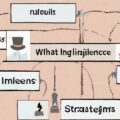What is Emotional Intelligence?
Emotional intelligence (EQ) refers to the ability to understand and manage your emotions, as well as recognize, empathize with and influence the emotions of others. It includes skills like self-awareness, empathy, motivation, impulse control and more.
Why is EQ Important?
EQ helps us build stronger relationships, succeed in our careers, make good decisions, manage stress effectively and generally live a more fulfilling life. It enables us to understand different perspectives, communicate effectively and resolve conflict in a constructive manner.
Common Emotional Intelligence Interview Questions
- How do you handle pressure and stress?
- Tell me about a time you faced conflict with a coworker or peer. How did you handle it?
- Give an example of when you faced a difficult challenge at work. How did you handle it?
- Describe a time when you failed at something. What did you learn from that experience?
- Tell me about a situation where you had to control your emotions in order to achieve a goal or resolve an issue.
Tips for Answering Questions on Your EQ
- Give specific examples that demonstrate resilience, empathy and people skills
- Focus on what you learned and how you grew
- Highlight emotional awareness and regulation
- Emphasize communication, listening and conflict resolution skills
- Convey positivity, optimism and a growth mindset
Best Answers to Common EQ Interview Questions
On Handling Pressure and Stress
I practice deep breathing, go for a walk or talk to supportive people in my life. Getting grounded this way helps me gain some perspective. I then make a list of actionable steps to resolve the situation. This enables me to channel stress into solutions.
On Facing Workplace Conflict
When a colleague and I disagreed over project timelines, I asked to speak privately. I acknowledged their view first, then explained my rationale calmly. We discussed compromises and found common ground. Now our communication is stronger.
On Overcoming a Big Challenge
When I struggled to meet an unrealistic sales quota, I voiced this openly rather than hide my failure. My manager explained the context behind the goal. Together we reset quotas based on actual sales data. This taught me the power of communication and self-advocacy.
On a Failure and What You Learned
Early in my career, my perfectionism led me to feel overwhelmed when projects didn’t meet my unrealistic standards. Through coaching, I learned perfection isn’t possible or necessary. Now I focus on constant progress rather than perfection by setting achievable goals and celebrating small wins.
On Controlling Emotions to Resolve Issues
When two colleagues had a heated disagreement, I resisted the urge to take sides. Instead I gave them space to cool off, then mediated by asking open-ended questions. This enabled everyone to share their perspective calmly until we reached a reasonable compromise.
FAQ
What are some examples of emotional intelligence?
Examples of emotional intelligence include self-awareness, empathy, managing emotions, motivation, integrity, optimism, and relationship skills like communication and conflict resolution.
What are common emotional intelligence interview questions?
Common EQ interview questions include how you handle pressure or stress, examples of workplace conflicts and how you resolved them, how you overcame obstacles or failures, and times you had to control emotions to achieve goals or solve problems.
How do you answer questions about EQ?
Focus your answers on emotional awareness, regulation, and interpersonal skills like empathy, communication, listening, and conflict resolution. Use specific examples of resilience in the face of stress or failure. Emphasize positivity, growth mindset and learning from challenges.
Why is emotional intelligence important in leaders?
Emotional intelligence enables leaders to understand their own and others’ emotions, build stronger relationships, communicate effectively, empathize, motivate teams, make thoughtful decisions, and manage stress productively. This leads to better performance.
What are some tips for improving your emotional intelligence?
Practice self-reflection, mindfulness and self-care. Observe others’ emotions and body language. Improve your listening and communication skills. Seek feedback and coaching. Learn from mistakes with a growth mindset. Develop empathy through different perspectives. Surround yourself with emotionally intelligent people.









